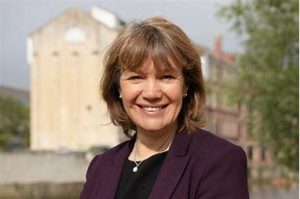Making historic Bath a city fit for the future

The city of Bath is famous across the globe for its stunning architecture and beautiful buildings.
And every year the thousands of tourists who make their way to the stunning Georgian city pump millions into its economy.
But the city, which is one of the few in the country to boast world heritage status, does have its own unique set of challenges and issues.
In a second in a series of round tables TheBusinessDesk.com brought together business leaders, academics and experts to examine how Bath can make itself a city fit for the future.
The event was supported by law firm Thrings and Bath and Bristol Regional Capital.
The aim was to discuss the challenges the stunning city faces and the measures that can be taken and the strategies that can be put in place to help it continue to grow and prosper.
Many people assume that Bath is a city of wealth and high living standards.
But Alex Sherman from the Bath Preservation Trust says the situation is not so clear cut.
He adds: “There is no doubt that Bath is a unique city in many ways, it is certainly more diverse than most cities in terms of the gap between the well-off and the not so well-off.
“The lack of social mobility is one of the biggest challenges facing the city, if you are born poor in the city then you are far more likely to die poor.
“It also a challenging city in terms of bringing about change because of the planning constraints it has as world heritage site.”
One of the biggest issues facing the city is the very thing that has made it one of the most popular tourist destinations in the UK.
Michael Tatters, head of property litigation at Thrings Solicitors said: “While Bath seeks to grow, it’s geography restricts the availability for housing, when faced with the demands of the ever-growing student population and the high value properties.
“From a property perspective, we need to look at how we can overcome the limitations in the numbers of housing we can deliver in the city and how we can utilise the space we have available for the kind of accommodation that the people wanting to get on the property ladder can afford.”
Developer TCN is delivering a major scheme in the city but director Richard Pearce knows all too well the hurdles that need to be overcome to deliver a development.
Richard said: “We operate in a number of different cities and we have the experience of working in different clusters and eco systems.
“Out of all the places we operate in across the UK Bath has got the most potential but it has also got the most limitations. That can be enormously frustrating for everyone concerned.
“There is an awful lot that can be done here and there is an enormous demand for great housing. However, there are limits in what can be achieved in terms of planning, conservation and the available land.
“There is not much space that people can occupy and the planning restrictions are particularly onerous because of the world heritage status.”
James Blundell, a director at property consultancy CBRE, added: “When we talk to potential clients one of the challenges is the barriers of entry into the city.
“It is not about a lack of demand or a lack of appetite from the major institutions to deliver developments.
“When you look at scalable investment opportunities they are either not there or they are so complicated to deliver it means that investors very quickly look for opportunities elsewhere.”
He added: “If you compare the South West to the Midlands and the North, there is greater scope for change and investment elsewhere.
“Bath is complicated given the historic nature of the city and the planning restrictions that tend to come with that. But it should not be forgotten that it is also one of the most attractive cities in the world in terms of its setting and architecture.”
Ros Trotman, is a partner at Thrings and specialises in property law.
She said: “We act for a lot of developer clients and I think planning is always a big challenge when it comes to delivering developments in any major city.
“That is particularly the case at the moment because of the number of changes we are seeing in the planning system. That means that there is a lot of uncertainty and a lot of delay.”
Ros added: “There are also a lot of issues around land values and a lack of incentives for landowners. There is an element of people holding their breath to see what happens with all the changes coming through the system and how it will affect the market.
“However, it is interesting to note that Bath is the first local authority to adopt a local plan with a net zero requirement.”
Leonie Fleming, a board member of Bristol and Bath Regional Capital, believes that there is a need to have an overarching strategy in place to help the city reach its full potential and attract new businesses.
She said: ”You have to ask the question whether there is city wide plan, is anyone looking right across the piece and asking the big questions?
“Is anyone asking if we are getting the right mix of development in the city in terms of residential and small business space as well as making the best use of the land that is available?
“That is always going to be one of the key questions which we need to address.”
Alastair Kimpton is a director at property consultancy CSquared and has worked on a number of schemes across the region.
He argued that Bath should target a specific market in order to reach its full potential.
He believes the key to opening up the city to new opportunities is scale.
He said: “Maybe one of the issues is the scale of development or the size of the schemes being considered as potential occupiers in the city.
“Rather than large scale office development which is more suited to other cities we should be looking at the kind of schemes which attract start-ups and the creative type of businesses. That might have greater appeal to investors who are looking for the next opportunity.”
Although best known as a tourist destination Bath is also a centre for study and has two major universities located close to the city centre.
Andy Salmon, Pro Vice Chancellor at Bath Spa University, said: “If you take the two universities together they are both highly rated universities. But research has been carried out by the council which looked at the people who come to study in the city and the reality is they do not stay when it comes to their careers.
“If the city wants to expand and continue to grow then it needs to address the issue of attracting young people and businesses. The city is very conscious it has an aging population.
“One in four people in the city are students but they are not regarded as part of the population. We need to think about the economic benefits if those people had jobs which would keep them in the city.”
Claire Smith is a director of Buro Happold and has inside knowledge on the many factors which can help cities to grow and evolve. She also understands the impact the impact that institutions such as universities can have.
She said: “We are now an international company but we were founded in Bath and our head office is still the city.
“That is very unusual for the construction industry but the city has a lot of assets that have kept us here. The links to the university are really key for us as an employer.”
She added: “I don’t think the city capitalises on the strength of the universities when it is marketing itself. The universities should be encouraged into the centre of the city which is what Bristol is doing with the new enterprise campus right by the station.
“Bringing the universities into the centre of the city and creating a whole eco system around that would make a huge difference.
“The fact that students are all out on campus is a real missed opportunity.”
Mark Hepworth, the founder of The Good Energy, says that the city has a vibrant business community but often struggles to attract outside investment.
He added: “We are a company that has grown up in the city. We now have 20 people and we have become a high growth company.
“The centre of the company is in Bath but a lot of our people work remotely and only come into the city when they need to.
“We also have an office in London and we find that a lot of our younger recruits want to go and work in London.”
He added: “When we talk about Bath as a place are we talking about the city or about Bath and North East Somerset? It is a really important distinction because they are two separate and distinctive places.
“What we need is more support for small companies who are working not just in the city but also in the wider Bath and North East Somerset area.”
Hayley Blacker is a director at Interaction – an office fit out company based in the city and she agreed with several of the points raised during the debate.
She added: “A lot of businesses tend to be in Bath because the founder lives here or there is a local connection. Businesses don’t tend to come from the outside because of all of the reasons we have been talking about.
“There is a lot of fantastic businesses here but the reality is that as soon as they get to a certain size they may not be able to grow and they have to start to look elsewhere.
“More than half the people who work for us live in other cities such as Bristol and Swindon and they travel into work.
“What Bath has in its favour is a strong close-knit community where people feel a part of the city.”
Ed Rowberry, from Bristol and Bath Regional Capital, commented on the fact that although Bath and Bristol are less than ten miles apart they operate in two separate ecosystems.
He said: “I am always amazed by the fact that there are two completely different networks even though the cities are so close together.
“I think Bath and Bristol could learn a lot from one another if they talked to each other.
“The bit that’s really interesting to me in Bristol is that once every six months they have these events called city gatherings.
“There is a massive opportunity in cities such as Bath to bring together businesses and anchor organisations such as the police and local authorities to work on a shared long-term vision.
“Businesses have a massive role to play and it can really help with the big issues facing all of such as inequality and decarbonisation.
Robert Delius is a director at architecture firm Stride Treglown and is based in the city.
He said: “As employers we all tend to concentrate on the young professionals but we can’t ignore needs of the wider workforce.
“Certainly in our company a lot of our people prefer to work in Bath rather than Bristol because of everything it has to offer.
“They also like what the villages and towns around Bath in terms of quality of life and living standards.”
He added: ” We should recognise that the two cities are different and offer different things, there is no point in trying to become a mini Bristol.
“We should celebrate the qualities we have here and we should tap in what this city has to offer and what makes it so special.”






















